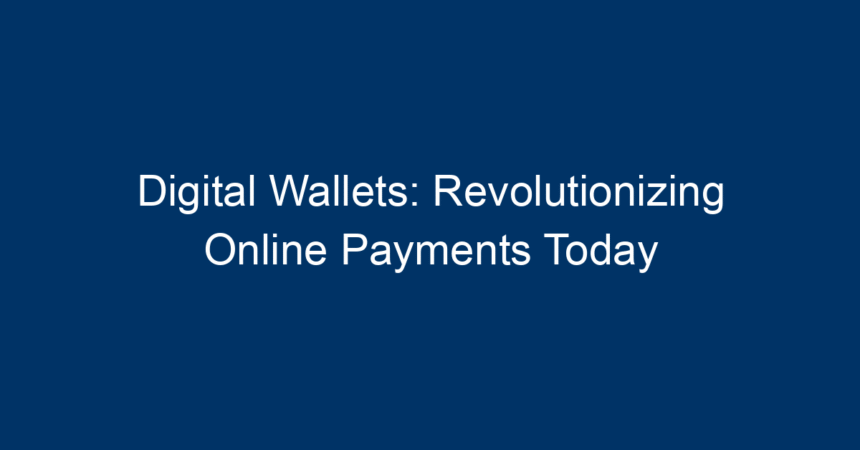In an increasingly interconnected world, the landscape of financial transactions is undergoing a remarkable transformation. Digital wallets are at the forefront of this revolution, offering convenience, security, and efficiency for consumers and businesses alike. As more people turn to digital solutions for their payment needs, understanding how digital wallets work and their benefits can empower you in making informed financial choices.
What Are Digital Wallets?
Digital wallets, often referred to as e-wallets, are applications or software that securely store payment information and passwords for various payment methods and websites. They allow users to make transactions electronically, eliminating the need for physical cash or cards. Popular platforms, such as PayPal, Apple Pay, Google Wallet, and Samsung Pay, have made it easier than ever for consumers to pay for goods and services with just a few taps on their smartphones.
The Components of Digital Wallets
- Storage: Digital wallets securely store your debit and credit card information, as well as other payment methods such as bank account details and loyalty cards.
- Security: Advanced encryption techniques and multi-factor authentication ensure that your financial data remains protected during transactions.
- Convenience: Digital wallets streamline payment processes both online and in-store, allowing users to complete transactions rapidly without the need for physical cards.
The Evolution of Online Payments
The shift from traditional payment methods to digital wallets marks a significant milestone in the evolution of online payments.
A Brief History
- Pre-1980s: Cash and checks dominated the payment landscape.
- 1980s to 90s: The introduction of credit cards revolutionized how consumers made purchases.
- Late 1990s to Early 2000s: The rise of the internet paved the way for online banking and e-commerce.
- 2000s Onwards: The emergence of mobile technology has given birth to digital wallets, making payments more accessible than ever.
Current Trends in Digital Wallet Adoption
According to recent studies, over 2 billion people worldwide are now using digital wallets. Increased smartphone penetration, a growing preference for contactless payments, and the global shift towards e-commerce have significantly contributed to the growth of this trend.
How Digital Wallets Work
The Payment Process
Using a digital wallet is generally straightforward:
- Set Up Your Wallet: Download the app and enter your payment information.
- Make a Purchase: When shopping online or in-store, select the digital wallet option at checkout.
- Authenticate: Use your PIN, fingerprint, or face recognition to authorize the transaction.
- Receive Confirmation: A notification or receipt confirms the successful payment.
Types of Digital Wallets
- Closed Wallets: These wallets can only be used within a specific platform, such as Uber or Amazon.
- Semi-Closed Wallets: These allow transactions with specified merchants but do not permit cash withdrawals.
- Open Wallets: These can be used for a broad range of transactions, from online payments to money transfers.
Benefits of Using Digital Wallets
1. Enhanced Security
One of the primary concerns for online consumers is security. Digital wallets employ advanced encryption and tokenization to protect sensitive data. Users can make payments without sharing their card information, reducing the risk of fraud.
2. Convenience and Speed
Digital wallets streamline the payment process, allowing users to check out in seconds. No need to fumble for cash or cards; a quick scan of your phone or a tap on a screen is all it takes.
3. Loyalty and Rewards Programs
Most digital wallets are integrated with loyalty programs, allowing users to earn rewards and cashback on purchases seamlessly. These features encourage brand loyalty and enhance the shopping experience.
4. Cross-Platform Compatibility
Modern digital wallets can be used across various devices, including smartphones, tablets, and even smartwatches. This versatility makes it easier to manage finances on the go.
5. Global Accessibility
As e-commerce continues to grow, digital wallets are becoming a global standard for payments. Whether you are traveling abroad or shopping from a foreign online store, digital wallets enable seamless currency conversions and international transactions.
Challenges Facing Digital Wallets
While the future of digital wallets looks bright, there are challenges to consider:
1. Digital Divide
Not everyone has equal access to smartphones or internet connectivity. This lack of access could hinder the widespread adoption of digital wallets in some regions.
2. Privacy Concerns
The collection of personal data by digital wallet providers raises significant privacy concerns. Users need to be aware of the information they share and how it is used.
3. Merchant Adoption
While many major retailers accept digital wallets, smaller businesses may not have the necessary infrastructure in place, limiting users’ payment options.
Future of Digital Wallets
The trajectory of digital wallets is positive, driven by technological advancements and consumer preferences.
Emerging Technologies
- Blockchain: As cryptocurrency gains traction, digital wallets equipped with blockchain technology could facilitate faster and more secure transactions.
- Artificial Intelligence: AI can enhance personalization and security features, making digital wallets even more appealing to users.
Anticipated Growth
Industry experts predict that the global digital wallet market will reach over $7 trillion by 2025. Factors fueling this growth include increased online shopping, the rise of mobile commerce, and improvements in payment processing technology.
Actionable Insights: Making the Most of Digital Wallets
To maximize the benefits of digital wallets, consider the following tips:
- Choose the Right Wallet: Research different options to find a digital wallet that meets your needs. Look for features like security, ease of use, and merchant compatibility.
- Enable Security Features: Take advantage of biometric identification and two-factor authentication to secure your wallet.
- Keep Your Wallet Updated: Regularly update your app to benefit from new features and security enhancements.
- Monitor Transactions: Regularly check your transaction history to identify any unauthorized activity promptly.
Conclusion
Digital wallets are revolutionizing the way we conduct online payments, offering unparalleled convenience, security, and efficiency. As the world shifts towards cashless transactions, embracing this technology can enhance your financial management strategies. By understanding how digital wallets work and their implications for the future, you can stay ahead in this rapidly evolving digital landscape. Whether you’re a consumer looking for convenience or a business owner aiming to meet customer demands, investing in digital wallets may be the key to success in the modern economy.
By making informed choices and leveraging the features of digital wallets, you can enjoy a seamless payment experience while safeguarding your financial future. The revolution in online payments is here—are you ready to embrace it?




